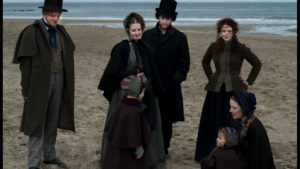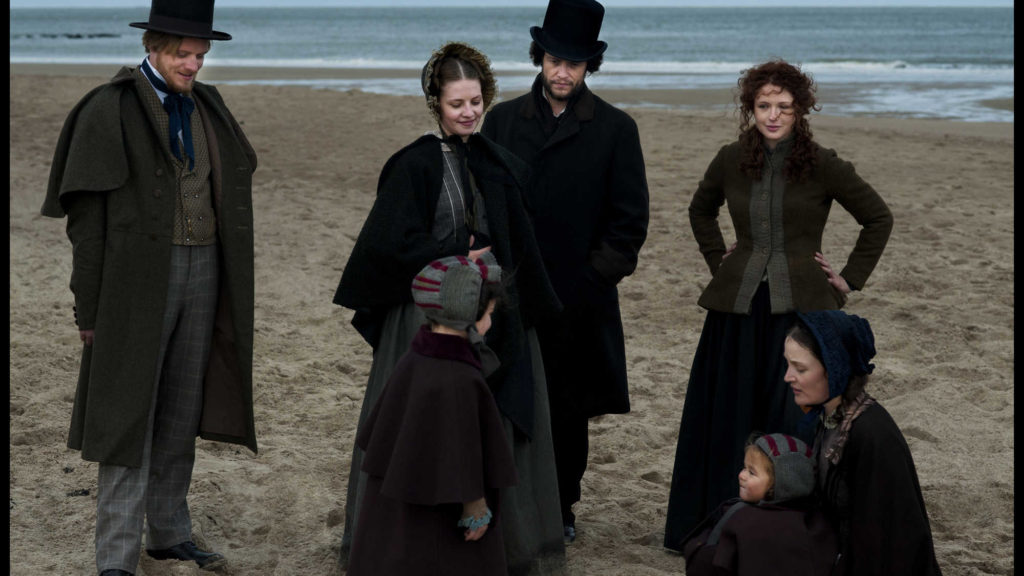Movie of the Week: “The Young Karl Marx”
 One film that promises to raise more discussions this year is the Franco-German production “The Young Karl Marx” (“Der junge Karl Marx”, GER / BEL / FRA, 2017).The strangest thing about this is that the discussions are not born due to technical aspects of the film, or even its content, but simply because of people’s intolerance and misinformation.
One film that promises to raise more discussions this year is the Franco-German production “The Young Karl Marx” (“Der junge Karl Marx”, GER / BEL / FRA, 2017).The strangest thing about this is that the discussions are not born due to technical aspects of the film, or even its content, but simply because of people’s intolerance and misinformation.
As the title informs, the story of the film focuses on the period of Karl Marx’s life in which he studies, interacts, collides with other thinkers, and develops with Friedrich Engels the “Communist Manifesto”, published in 1848.
In 1844, 28-year-old Karl Marx (August Diehl) writes in a newspaper articles about German society, and in particular the living conditions of the workers. Pursued by the police and censored by the government, he is forced to exile in Paris, where he goes with his wife Jenny (Vicky Krieps), a young aristocrat who abandons his traditional family to live the dream of Marx.
 Life is not easy in exile, especially with a child, and many financial difficulties. It is when Marx meets the equally young Friedrich Engels (Stefan Konarske), son of a wealthy Prussian industrialist with several weavings in Manchester, England.
Life is not easy in exile, especially with a child, and many financial difficulties. It is when Marx meets the equally young Friedrich Engels (Stefan Konarske), son of a wealthy Prussian industrialist with several weavings in Manchester, England.
Engels was dissatisfied with the conditions of his own servants, and with his own impotence to make any improvement to them. That’s why he is impressed by the daring Irish Mary Burns (Hannah Steele), an employee of his father’s factory who dares to confront him.With her aid, which would become his wife, he has access to statements that will serve as the basis for his book “The Situation of the Working Class in England”.
 When the two begin to work together, the partnership is almost symbiotic. Marx, the thinker, prefers to stand in the background, providing the ideas, while Engels takes on the role of exposing them and confronting the leaderships at assemblies and congresses.
When the two begin to work together, the partnership is almost symbiotic. Marx, the thinker, prefers to stand in the background, providing the ideas, while Engels takes on the role of exposing them and confronting the leaderships at assemblies and congresses.
Although during the almost two hours of movie numerous characters appear on the screen, there is no philosophical or ideological deepening, focusing that there was a major conflict of interest between economic power and the working class. Things do not seem to have changed since then, have they?
 In fact, the film’s biggest problem is exactly a lack of contextualization. At that time, 1843, there were few countries where government systems could be considered democratic. The United States was a young nation, with only seventy years of independence, where Northern industry would clash with southern slave society in a bloody civil war.
In fact, the film’s biggest problem is exactly a lack of contextualization. At that time, 1843, there were few countries where government systems could be considered democratic. The United States was a young nation, with only seventy years of independence, where Northern industry would clash with southern slave society in a bloody civil war.
Most of the European countries were constituted of absolutist monarchies, with nobles very distant of the people, that lived in very bad conditions. The British Empire, at that time the greatest world power, was so extensive that it had the denomination “the empire where the sun never sets”. Africa and Asia were shared by the European powers that exploited them with great cruelty and greed.
 It is no wonder that in these conditions the world was conducive to the emergence of ideas that allowed one to dream of better living conditions.In this field, ideologies such as socialism, anarchism, liberalism, communism, and many others thrived, with more or less followers. If we add to this were poor working, health, food and housing conditions, the recipe was complete.
It is no wonder that in these conditions the world was conducive to the emergence of ideas that allowed one to dream of better living conditions.In this field, ideologies such as socialism, anarchism, liberalism, communism, and many others thrived, with more or less followers. If we add to this were poor working, health, food and housing conditions, the recipe was complete.
The curious thing is that, although the film only shows a vision of the world at that time, and of two thinkers whose ideas had worldwide repercussion, the reaction of the people when reading the title was an exaggeration that unfortunately became common in the days of today.
 Many people wanted to know if the film was a doctrinaire, as if, by watching it, one person would became communist, as magic. Others confused Marx with Stalin, claiming that he had had killed millions of persons.Worse still it was those who mixed things up, saying that Hitler was a communist, because in the name of the Nazi party had the word socialism .
Many people wanted to know if the film was a doctrinaire, as if, by watching it, one person would became communist, as magic. Others confused Marx with Stalin, claiming that he had had killed millions of persons.Worse still it was those who mixed things up, saying that Hitler was a communist, because in the name of the Nazi party had the word socialism .
These people, putting their ignorance and prejudices to the fore, miss the opportunity to learn a little about universal history, and the conditions that propitiated a movement, which, whether they like it or not, has revolutionized much of the world.
“The Young Karl Marx” is a film technically very well done, with historical accuracy, and without any pretense of “indoctrination”. Contrary to popular belief, no one dreamed of dictatorships, gulags, Cultural Revolution, or any of these dire consequences, but simply getting better living conditions for people. Try it – without prejudice.
Original Title: “Der junge Karl Marx”






